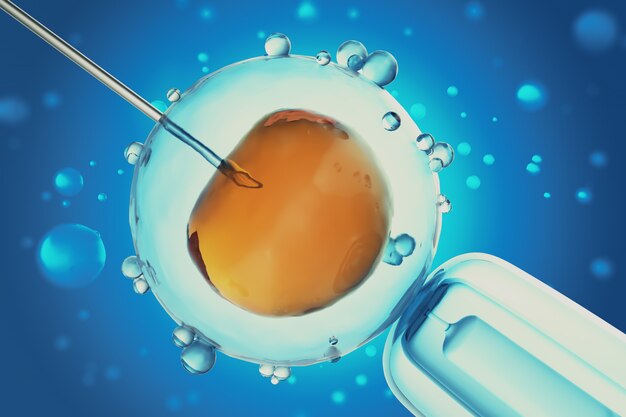Introduction
In Vitro Fertilization (IVF) has revolutionized the landscape of assisted reproductive technology (ART), offering pathways to parenthood for countless individuals and couples facing infertility. Among the advancements within IVF, Intracytoplasmic Sperm Injection, commonly known as ICSI in IVF, stands out as a specialized and highly effective technique. This guide aims to provide a comprehensive understanding of how ICSI in IVF works, shedding light on its crucial benefits, particularly in overcoming the challenges posed by male factor infertility. For those exploring options to build their family, understanding the intricacies of this fertility treatment and what to expect during the ICSI procedure is paramount.
ICSI in IVF represents a significant step forward in addressing specific infertility hurdles. Unlike conventional IVF, where fertilization occurs by bringing sperm and egg together in a laboratory dish and allowing nature to take its course, ICSI in IVF involves a more direct approach. This targeted intervention has proven to be a game-changer for couples facing situations where natural fertilization is unlikely. By delving into the details of ICSI in IVF, we aim to empower you with the knowledge needed to navigate your fertility journey with greater clarity and confidence, particularly if sperm injection IVF has been recommended as a potential solution.
Understanding ICSI (Intracytoplasmic Sperm Injection) in IVF
At its core, ICSI in IVF is a sophisticated variation of the standard In Vitro Fertilization (IVF) process. The fundamental principle remains the same – fertilization occurs outside the body in a laboratory setting. However, the key distinction lies in how fertilization is achieved. In traditional IVF, a large number of motile sperm are placed in a dish with the retrieved eggs, and the sperm must independently penetrate the egg’s outer layers to achieve fertilization. In contrast, ICSI in IVF bypasses this natural selection process.
During ICSI in IVF, a highly skilled embryologist uses specialized micromanipulation equipment to carefully select a single, healthy-looking sperm and directly inject it into the cytoplasm – the inner substance – of a single mature egg. This precise sperm injection IVF technique ensures that fertilization occurs even when the sperm may have difficulty penetrating the egg on its own. The entire ICSI procedure is meticulously performed within the controlled environment of an embryology laboratory, a crucial component of the overall IVF cycle. This targeted approach in ICSI in IVF has significantly improved the chances of successful fertilization for many couples facing specific challenges.
Why is ICSI in IVF Recommended?
The decision to incorporate ICSI in IVF into a fertility treatment plan is typically driven by specific factors, most notably issues related to male factor infertility. This specialized approach often becomes the preferred fertility treatment in situations where the male partner presents with significant challenges in their sperm. One of the primary reasons for recommending ICSI in IVF is a significantly low sperm count, a condition known as oligospermia. When there are fewer sperm available, the chances of natural fertilization in standard IVF are considerably reduced, making ICSI a more effective alternative.
Similarly, problems with sperm motility, or asthenospermia, where the sperm have difficulty swimming effectively towards the egg, can hinder natural fertilization. In such cases, the direct sperm injection IVF offered by ICSI can overcome this obstacle. Abnormal sperm morphology, or teratozoospermia, where a high percentage of sperm have an irregular shape, can also impair their ability to fertilize an egg naturally, again making ICSI in IVF a valuable solution. Furthermore, conditions affecting sperm release, such as anejaculation or retrograde ejaculation, or physical blockages in the male reproductive system that prevent the release of sperm in the ejaculate, often necessitate the use of surgically retrieved sperm (e.g., through procedures like TESE, MESA, or PESA). In these scenarios, where only a limited number of sperm might be available, ICSI in IVF maximizes the chances of fertilization.
Beyond male factor infertility, there are other critical situations where ICSI in IVF may be the recommended path. Couples who have experienced a history of failed or very low fertilization rates in previous IVF cycles may benefit from the targeted approach of ICSI. Additionally, when working with frozen eggs, which can sometimes have a hardened outer layer, ICSI in IVF can increase the likelihood of successful fertilization. The use of ICSI in IVF is also common when Preimplantation Genetic Testing (PGT) is planned, as it minimizes the risk of contamination from stray sperm that could affect the accuracy of the genetic analysis. In some instances of unexplained infertility or in cases involving advanced maternal age, where concerns about egg quality and fertilization potential may arise, ICSI in IVF might also be considered as a proactive measure to improve the odds of success.
How ICSI in IVF Works: A Detailed Breakdown of the Process
The ICSI procedure within an IVF cycle is a carefully orchestrated series of steps, each requiring precision and expertise. Understanding this process can help demystify ICSI in IVF for those considering this fertility treatment.
The journey typically begins with ovarian stimulation, a phase common to all IVF cycles. Fertility medications are administered to stimulate the ovaries to develop multiple mature eggs, increasing the chances of having several eggs available for the ICSI procedure. Once the follicles containing the eggs have reached the appropriate size, the next step is egg retrieval. This minimally invasive procedure is usually performed under sedation and guided by transvaginal ultrasound. A needle is used to aspirate the fluid from the follicles, which contains the eggs.
Simultaneously, or shortly before egg retrieval, the male partner will provide a sperm sample. In cases of severe male factor infertility or when there are issues with ejaculation, surgical sperm retrieval techniques like TESE, MESA, or PESA might be employed to obtain sperm directly from the testes or epididymis. Once the sperm sample is collected, it undergoes a process of sperm collection and preparation in the laboratory. Embryologists carefully wash and process the sperm to isolate the healthiest and most motile sperm for the ICSI procedure.
The retrieved eggs are then meticulously examined in the lab. Only mature eggs are suitable for ICSI in IVF, and these will undergo egg preparation. The layer of cells surrounding the mature eggs, known as the cumulus cells, is gently removed to allow the embryologist to clearly visualize the egg and its maturity.
The core of the ICSI procedure involves the delicate microinjection of a single sperm into an egg. First, a single, healthy-looking sperm is carefully selected and then gently immobilized. Next, a mature egg is held steady using a specialized holding pipette. With the aid of a high-powered microscope and micromanipulation devices, the embryologist carefully inserts an ultra-fine, sharp needle (micropipette) containing the immobilized sperm through the egg’s outer layers – the zona pellucida and the oolemma. The sperm is then gently injected directly into the cytoplasm, the inner substance of the egg, during this critical step of sperm injection IVF. The micropipette is then carefully withdrawn to ensure the egg remains intact after the ICSI procedure.
Following the sperm injection, the injected eggs are placed in a carefully controlled incubator and monitored overnight. The next day, the embryologists will perform a fertilization check to see if the eggs have successfully fertilized, indicated by the presence of two pronuclei (the genetic material from the sperm and the egg). The successfully fertilized eggs, now called zygotes, are then placed back in the incubator for embryo culture, where they will begin to divide and develop into embryos. Over the next few days, the embryos are closely monitored for their quality and rate of development. Finally, after a few days of culture, one or more of the best quality embryos will be selected for embryo transfer back into the woman’s uterus, with the hope of achieving a successful pregnancy following the ICSI in IVF cycle.
Key Benefits of Choosing ICSI in Your IVF Treatment
Opting for ICSI in IVF offers several significant advantages, particularly for couples facing specific infertility challenges. Primarily, ICSI in IVF dramatically increases the likelihood of fertilization in cases of severe male factor infertility. By directly injecting a single sperm into the egg, ICSI effectively bypasses many of the barriers that can prevent natural fertilization, such as low sperm count, poor sperm motility, or abnormal sperm shape. This targeted approach can make the difference between failed fertilization and the potential for a successful pregnancy.
Furthermore, ICSI in IVF proves invaluable when utilizing surgically retrieved sperm. In situations where the male partner has no sperm in his ejaculate, sperm can often be retrieved directly from the testes or epididymis. However, the number of sperm obtained through these methods is often limited. ICSI allows for successful fertilization even with a very small number of viable sperm, maximizing the chances of creating embryos. Additionally, for couples who have experienced repeated low or failed fertilization rates in previous traditional IVF attempts, ICSI in IVF can often lead to significantly improved outcomes. Ultimately, the key benefit of ICSI in IVF is that it offers a realistic and often highly successful pathway to biological parenthood for couples who might otherwise face significant obstacles due to male infertility.
Understanding the Potential Risks Associated with ICSI in IVF
While ICSI in IVF has revolutionized the treatment of male infertility, it’s important to be aware of the potential risks and considerations associated with the ICSI procedure. One potential, though rare, risk is damage to the egg during the delicate sperm injection process. Despite the skill and experience of embryologists, the micromanipulation involved carries a slight possibility of injury to the egg. Additionally, even with successful sperm injection, there is no guarantee that the egg will fertilize. The complex biological processes required for fertilization may still not occur in some instances. Similarly, even if fertilization does take place, the resulting fertilized egg may not develop into a viable embryo capable of implantation.
There has been ongoing research into whether ICSI in IVF is associated with a slightly increased risk of certain rare imprinting disorders or birth defects in offspring compared to natural conception or traditional IVF. While studies are still being conducted and the absolute risk is considered low, this is a factor that fertility specialists will typically discuss with patients. It’s also important to remember that ICSI in IVF is still a component of the overall IVF process, and therefore carries the general risks associated with IVF, such as ovarian hyperstimulation syndrome and the possibility of multiple pregnancies if more than one embryo is transferred. Furthermore, if the male partner’s infertility has a genetic basis, there is a potential for male offspring to inherit the same condition. A thorough discussion of these potential risks with your fertility doctor is crucial before proceeding with ICSI in IVF.
What are the Typical Success Rates for ICSI in IVF?
Understanding the ICSI success rates is a key consideration for individuals and couples contemplating this fertility treatment. It’s important to note that success rates for ICSI in IVF, like all IVF procedures, are influenced by a variety of factors. These include the age of the female partner, as egg quality plays a significant role, the quality of the sperm used in the ICSI procedure, the underlying cause(s) of infertility, and the experience and technological capabilities of the fertility clinic.
Generally, the fertilization rates achieved with ICSI in IVF are quite high, with studies showing that a significant percentage (often between 50-80%) of injected eggs will successfully fertilize. However, it’s crucial to understand that the ultimate measures of success are pregnancy and, more importantly, live birth rates. These rates following ICSI in IVF are generally comparable to those achieved with traditional IVF when ICSI is specifically indicated for male factor infertility or other relevant conditions. Your fertility specialist will be able to provide you with more specific success rate data based on your individual circumstances and the clinic’s historical outcomes with ICSI in IVF.
Determining if ICSI in IVF is the Right Path for You
Identifying who is a good candidate for ICSI in IVF is a crucial step in the fertility evaluation process. As previously discussed in the section on why ICSI in IVF is recommended, this specialized technique is primarily considered when there are significant concerns related to male factor infertility. This includes men with a very low sperm count, poor sperm motility, abnormal sperm shape, or issues with ejaculation that hinder natural sperm delivery.
Furthermore, individuals who require surgically retrieved sperm due to blockages or other conditions are also typically excellent candidates for ICSI in IVF, as this method allows for fertilization even with a limited number of sperm. A history of failed or poor fertilization in previous traditional IVF cycles is another strong indication that ICSI in IVF might be a more effective approach. Ultimately, the decision of whether ICSI in IVF is the right fertility treatment for you should be made in consultation with a qualified reproductive endocrinologist. They will conduct a thorough assessment of both partners’ fertility profiles to determine the most appropriate and personalized treatment plan.
Understanding the Fundamental Differences Between ICSI and Conventional IVF
While both ICSI in IVF and traditional IVF aim to achieve pregnancy through fertilization outside the body, the key difference lies in the method of fertilization itself. In conventional IVF, a large number of motile sperm are placed in a dish with the retrieved eggs, and fertilization occurs “naturally” as the sperm attempt to penetrate the egg’s outer layers. This approach relies on the sperm’s inherent ability to find and fertilize the egg.
In contrast, ICSI in IVF bypasses this natural process. The ICSI procedure involves the direct injection of a single, carefully selected sperm into the egg. This active intervention by the embryologist is the defining characteristic of ICSI in IVF. As a result, ICSI in IVF can be successful even when the male partner has a very low sperm count or issues with sperm motility or morphology, conditions that would significantly reduce the chances of success with traditional IVF. Therefore, ICSI in IVF is primarily indicated for cases of male factor infertility, while traditional IVF is used for a broader range of infertility diagnoses, including female factor issues.
Conclusion
In conclusion, ICSI in IVF stands as a remarkable advancement in the realm of assisted reproduction, particularly in its ability to address and overcome significant challenges posed by male infertility. By employing the precise technique of direct sperm injection, ICSI in IVF offers a viable pathway to parenthood for many couples who might otherwise face insurmountable obstacles. The detailed ICSI procedure, while intricate, has proven to be highly effective in achieving fertilization even in cases with severely compromised sperm parameters or when using surgically retrieved sperm.
The benefits of ICSI in IVF extend to improved fertilization rates in situations where traditional IVF may have limited success. While it’s essential to be aware of the potential risks and to have realistic expectations regarding ICSI success rates, this specialized fertility treatment has undeniably transformed the landscape of reproductive medicine. For individuals and couples navigating the complexities of infertility, consulting with a knowledgeable fertility specialist to explore whether ICSI in IVF is the right approach can be a crucial step towards realizing their dream of building a family. The hope that ICSI in IVF offers is a testament to the ongoing progress in assisted reproductive technology.
If you are facing challenges with male infertility or have been advised that ICSI in IVF may be a suitable option for you, we encourage you to take the next step. Contact The Life Fertility Clinic today to schedule a comprehensive consultation. Our experienced team can provide personalized guidance and discuss how ICSI in IVF can help you on your journey to parenthood.
FAQs
Is ICSI in IVF painful?
The egg retrieval process in IVF, during which eggs for ICSI are collected, is typically performed under sedation or anesthesia, so you should not feel pain during the procedure. Similarly, the embryo transfer is usually a painless procedure. The ICSI procedure itself is performed on eggs in the lab, so it does not involve any sensation for the patient.
What is the main difference between standard IVF and ICSI in IVF?
In standard IVF, fertilization occurs by placing sperm and eggs together in a dish and allowing the sperm to naturally fertilize the egg. In ICSI in IVF, a single sperm is directly injected into the cytoplasm of a single egg by an embryologist. This direct sperm injection IVF method overcomes many barriers to fertilization.
Can ICSI in IVF overcome all types of male infertility?
ICSI in IVF is highly effective for many types of male factor infertility, especially issues with sperm count (oligospermia), sperm motility (asthenospermia), and sperm morphology (teratozoospermia). However, in cases of complete absence of sperm in the ejaculate, surgical sperm retrieval may be necessary, and the success of ICSI will then depend on the quality of the retrieved sperm.
What are the costs associated with ICSI in IVF?
The cost of ICSI in IVF can vary depending on the fertility clinic, location, and your individual treatment plan. It is generally an additional cost to the standard IVF procedure due to the specialized techniques and expertise involved. Please contact The Life Fertility Clinic for detailed information on our treatment costs.
How long does the ICSI in IVF process take?
The timeline for an ICSI in IVF cycle is similar to a standard IVF cycle, typically taking around 4-6 weeks from the start of ovarian stimulation to the pregnancy test. This includes the egg retrieval, the ICSI procedure, embryo culture, and finally, the embryo transfer.
Are the chances of birth defects higher with ICSI in IVF?
While some studies have suggested a slightly increased risk of certain rare imprinting disorders or birth defects with ICSI, the absolute risk is still considered low. Our specialists at The Life Fertility Clinic can discuss this in more detail with you based on the latest research.
What if no sperm are found during surgical retrieval for ICSI in IVF?
In the unfortunate event that no viable sperm are found during surgical sperm retrieval, our team at The Life Fertility Clinic will have a sensitive and thorough discussion with you about alternative options, such as using donor sperm.



